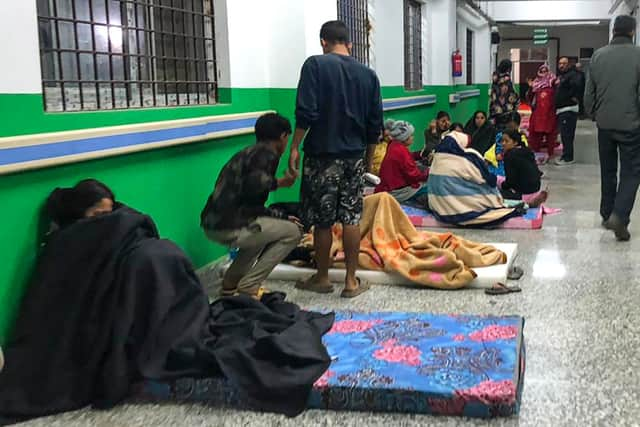Earthquake in Nepal: 2023 FCDO travel advice, is it safe to travel to Kathmandu - news
and live on Freeview channel 276
Aid has begun to gradually reach the villages of Nepal's northwest mountains, after they were devastated by a powerful earthquake over the weekend, as local residents scour the debris of their shattered homes hoping to salvage any remaining belongings.
Authorities are continuing their efforts to deliver essential supplies, including food, tents and medicines, to remote villages that are often accessible only by foot. Landslides triggered by the earthquake have also blocked several roads, with soldiers working to clear these obstructed routes.
What happened?
Advertisement
Hide AdAdvertisement
Hide AdThe earthquake, measuring 5.6 on the Richter scale, struck shortly before midnight on Friday (3 November), resulting in numerous injuries and the loss of 157 lives, and rendering thousands of people homeless.
Nepal's National Earthquake Monitoring and Research Centre confirmed that the epicentre of the earthquake was located in Jajarkot, approximately 250 miles northeast of the capital, Kathmandu. According to the US Geological Survey, the earthquake originated at a depth of 11 miles. It was felt as far as India's capital, New Delhi, over 500 miles away.


Mina Bika said her family was sleeping on Friday night when the ceiling fell and buried them. A relative rescued them. Her husband was badly injured and taken to hospital in the town of Surkhet while she and the couple’s two sons were only lightly hurt.
“It felt like the world had collapsed and I was not sure if anyone had even survived and would be able to help,” she said.
Advertisement
Hide AdAdvertisement
Hide AdFollowing a Cabinet meeting on Sunday (5 November), Communications Minister Rekha Sharma informed reporters that the government's primary focus was on providing food and establishing temporary shelters.
They were also working on plans to reconstruct damaged houses in the districts of Jajarkot and Rukum, where houses traditionally constructed by stacking rocks and logs collapsed or suffered severe damage.
Rescue and search teams reported on Monday (6 November) that the initial phase of their mission, focused on rescuing survivors, providing medical care to the injured, and searching for bodies, had been completed.
Government official Harish Chandra Sharma said: “Now we are working on the second phase of our work to distribute relief material, get aid to the villagers, and at the same time we are collecting details about the damages."
Advertisement
Hide AdAdvertisement
Hide AdThe authorities distributed rice, oil, instant noodles, and salt to sustain the villagers for a few days. While a fortunate few had access to tarpaulin and plastic sheets for temporary shelter, thousands of others had to endure a third night exposed to the cold.
What is the FCDO travel advice?
The Foreign, Commonwealth & Development Office (FCDO) provides advice about risks of travel to help British nationals make informed decisions.
In wake of the 5.6 magnitude earthquake, the FCDO has not issued any specific warnings against travelling to Morocco, or even any of the regions directly affected by the incident. But it says those wishing to travel "Check with your tour operator to find out what contingency plans they have for an earthquake."
"Earth tremors are common across Nepal," it adds. "The impact of an earthquake is likely to be worsened by the lack of emergency equipment and poorly resourced medical facilities. British Embassy assistance will be slow to reach you if you are in a remote area."
Comment Guidelines
National World encourages reader discussion on our stories. User feedback, insights and back-and-forth exchanges add a rich layer of context to reporting. Please review our Community Guidelines before commenting.
